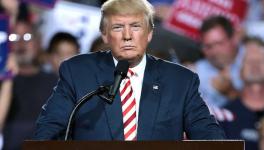Trump is Gone: Now Democrats Have to Make him Irrelevant
Former senator Joseph R Biden was declared president-elect of the United States on 7 November after four days of quite compelling political theatre amplified by 24x7 reporting of high quality on American television channels. People throughout the world joined Americans in heaving a sigh of relief.
The very thought that the United States, and the world, has seen the back, so to speak, of President Donald J Trump has lifted what has been a toxic pall hanging over the country. This statement needs qualification, but it is indisputable that Trump’s capacity for disruption and destruction will be radically curtailed once he leaves his current 1600 Pennsylvania Avenue address; if needed dragged out kicking and screaming.
Trump is deserving of the odium that has been heaped upon him over the past four years and will no doubt continue to be heaped upon him in future. In winning the presidential contest, Biden has amassed the largest number of votes any contestant has won in a presidential contest, but in losing, Trump secured the second largest number ever, edging ahead of Barack Obama’s record total of 2008.
This has been spun by some as some kind of vindication of the outgoing president. But the stark fact is that Trump has joined a select club of presidents who failed to win re-election, joining four others in this century and the last one and two, Jimmy Carter and George Bush Sr., since World War II. If it is extraordinarily difficult to beat an incumbent president, it is reasonable to say that it’s extremely difficult to lose as one.
One reason behind Trump’s huge haul of votes was the huge turnout—the highest in 120 years. Obviously that didn’t happen automatically. Both Trump and Biden were successful in bringing out their voters in large numbers—the latter successful in substantial measure by an unprecedented expansion in mail-in voting.
In Biden’s case, the huge turnout was clearly actuated more by a desire on the part of diverse groups of people to make sure that Trump did not get a second term, a second tilt at swinging his wrecking ball to demolish the institutions and established conventions that allow democracy to work to further a project of pure self-aggrandizement. In Trump’s case, the success in getting his voters out was based on his success in consolidating his base of mainly white voters with a grievance, though in pockets he did get substantial support from Hispanics (Cuban-Americans in Florida) and African-American men (up 2% from 2016).
The case against Trump rests on several pillars, but the most notable feature of his stint as president has been his relentless attempts to demonise and insult ethnic minorities—Hispanics, African Americans, or, generally speaking, people of colour—while encouraging white supremacists to step up to the plate. In the course of the first presidential debate, Trump refused to condemn Proud Boys, a far-Right group, and instead said he would ask them to “stand back and stand by”.
Trump’s misogyny has also often been hung out to dry with the washing, including in his comments on vice president-elect Kamala Harris after she was picked by Biden as running mate. He described her first as “nasty”, a default description for female opponents, then as a “monster”. And finally, in a sexist rant, Trump said in late October, “We’re not supposed to have a socialist—look we’re not going to have a socialist president, especially a female socialist president, we’re not gonna have it, we’re not gonna put up with it.” All this, of course, after mixing racism with misogyny, while questioning Harris’s right to contest because she was born to immigrant parents.
Trump’s dog whistling has not been confined to messaging his racist constituency. It has also been used to encourage bizarre, and some would say dangerous, conspiracy theories, especially those peddled by QAnon, a group that has been designated by the FBI as a domestic terrorist threat. For Trump, pretty much anything that shored up his position was worth his support.
Trump’s dark instincts, in fact, seem to dovetail with those of white supremacists. Much before he decided to run for president, he had taken a prominent part in peddling conspiracies and lies about Obama’s birthplace and religion—the infamous “birtherism” falsehood, which did quite a bit to pitch Trump into Republican political circles and provide traction for his rise on the party ladder.
Infamously, Trump has also weighed in on the side of those swathes of the public that are anti-science, with disastrous consequences for the handling of the Covid-19 pandemic in the United States. This is of a piece with his complete disregard for facts, expressed in his constant resort to mendacity. It appears that the Republican Party has embraced, with him, a post-truth world. This was most clearly expressed when a senior Trump aide, Kayleigh McEnany, referred to the president’s inflation of the numbers who attended his inauguration, basically a fabrication, as “alternative facts”.
Trump’s conduct on the global stage has also been a mixture of the bizarre and destructive. He has repeatedly broken with traditional allies while demonstrating a willingness to kowtow to or cosy up with authoritarian leaders – Vladimir Putin in Russia, Recep Tayyip Erdogan in Turkey, Xi Jinping in China and, most notably, Kim Jong-un in North Korea. In the process, he has torn up all the basic manuals of international dealings. Taking the United States out of the World Health Organization in the middle of the pandemic perfectly illustrated his willingness to do anything that would further personal goals—in this case, re-election to the presidency, which was being threatened by his inept handling of the crisis.
To return to the issue of Trump’s capacity to continue to wield his weapons of destruction, it must be said it is likely to remain formidable in both the short and long term. Trump will remain president for the next two and a half months. He can do a lot of damage just by withholding cooperation to the incoming administration. In addition, he can pursue a scorched-earth path, which will leave Biden and Harris to pick up a whole lot of debris when they finally get in.
If Trump remains in the frame as the patron saint of the Republican Party and the prime mover of its base—or his base—there is scope for greater long-term destruction, by fostering the high pitch of antagonism and making it difficult for Biden to undertake constructive programmes.
It is, however, necessary to recognize that Trump’s toxic vulgarity was enabled by the “new” Democrat presidents—Bill Clinton and Barack Obama. The former followed a trajectory mapped by his Republican predecessors, which resulted in the widening of economic inequalities and the sense among large swathes of the people that they were being left behind. In the wake of the 2008 economic crisis, Obama had the historic opportunity to rein in the financiers and the bankers and set the path towards more equitable growth. He spurned it, continuing to enable what the economist Joseph Stiglitz has called the 1%.
Economic inequality has been compounded by a style of Washington-based politics of elite accommodation that leaves ordinary people in the rest of the country feel disenfranchised and disempowered. It is this widespread sentiment with which Trump’s incendiary call to ‘drain the swamp’ resounded.
Disturbingly, given the thinner victory the Democrats have achieved than they had hoped for and pollsters predicted, the centrists in the party have already launched a campaign against those on the left—Bernie Sanders, Alexandria Ocasio-Cortez and the “squad”, and others. This not only amounts to attacking the countless “progressive” grassroots workers who worked tirelessly to bring out the Democratic vote—historically a difficult task—but also ignores the fact that it is precisely the centrist temporization of the Democratic leadership and their tender concern for the 1% that keeps it alienated from the working people.
Biden will likely have to negotiate with a hostile Senate. Even so his first priority must be a reset, which will incorporate promises already made—including healthcare insurance for all and a new green deal.
The author is a freelance journalist and researcher. The views are personal.
Get the latest reports & analysis with people's perspective on Protests, movements & deep analytical videos, discussions of the current affairs in your Telegram app. Subscribe to NewsClick's Telegram channel & get Real-Time updates on stories, as they get published on our website.





















